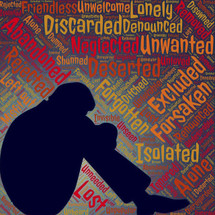Posted by Michael R. Poll on Feb 10th 2024
Cornerstone Blog ~ Ostracizing “the Other”
Ostracizing “the Other”
By Michael R. Poll
Human nature is such that it always seems easier to criticize, blame and attack the other guy or a group over there rather than ourselves or one from our group. All of our problems must be because of those other guys and if they would only be like us, or join us, then all of our problems would certainly go away. Throughout history we can point to numerous examples of how one group would minimize, dehumanize, and place all blame for problems on another group rather than just accept that we can all be different and work together. Maybe we find it easier to place blame rather than accept responsibility and deal with issues ourselves. But why?
Masonry provides a blueprint in its teachings that, if applied, can help us improve ourselves. Our goal is often stated that we take good men and make them better. But, if we achieve that goal, why do we have disagreements and even harsh conflicts between Masons? I believe that an answer might be found in the early days of Masonry in the United States. A flaw may exist in our initial U.S. Masonic design.
In the early days of U.S. Masonry, there was a desire for each Grand Lodge to be sovereign, but for the Masonic experience in one place to be very similar to other places. There was a desire for one ritual (Preston-Webb) and one language (English). There was a desire for all lodges and all Masons to be the same—on the level. The problem is that we are not all the same. We have different likes, dislikes, abilities, dreams, and goals. We don’t look or act the same. So, if we are supposed to all be alike, but we are different, then it follows that different may also be a judgement (better or worse). Insecurities can then creep in suggesting that the other thinks of himself as (or, worse yet, is) better than us! That does not make us feel good, and it does not matter if such evaluations are sound or logical. If we feel something, we feel it. We then need rank, position, degrees, and authority to make us feel better and superior to the other who is different than us. We would also need to hold down the troublemakers so that they are put in their perceived place. Ostracizing the other allows us to preserve any illusions that we may have of ourselves and relieves us of any guilt in our actions against the other. The need for all this extra effort seems to be a valid reason to dislike the other.
When differences are acknowledged as the norm, our expectations allow for these differences. It is okay if some can sing beautifully while we can’t carry a tune in a bucket. Or some are better at math or art. When we recognize that we are all different, then our own personal talents (maybe very different than the talents of others) are allowed to develop with no judgement or envy concerning another’s talent. We can enjoy each other and the variety of experiences. The Masonic goal of making ourselves better puts us in sole competition with ourselves and not our neighbor. There is no longer a need to focus on what the other can or cannot do. We judge our own work, not the work of anyone else.
Perhaps Masonry in the U.S. would benefit by taking a close look at Masonry around the world. We can find diversity in ritual, language, and practices. Differences are recognized and embraced. Where you see variety in the Masonic experience, you see Masonic growth. If we are stuck in “the way it has always been done” mindset, then we must realize that we are not speaking of the whole of Masonry around the world. We are speaking only of our Masonry, not the others.
Few enjoy being forced into something undesired. If I enjoy strawberry ice cream, why should I be forced into eating rocky road? If we desire that all our lodges be alike, then we need to recognize that others may desire their lodges to be a little different, and that is okay. If the ritual is different (but delivers the Hiramic Legend), or if they all wear tuxes (or, overalls), or if they do, or do not, read their minutes, it is okay. We need to recognize that we do not all need to be in lock-step with each other. We should spend our time working on the improvement of ourselves rather than on finding fault with the other.
(first published in “A Masonic Evolution:The New World of Freemasonry” Copyright © 2019-2022 by Michael R. Poll)

